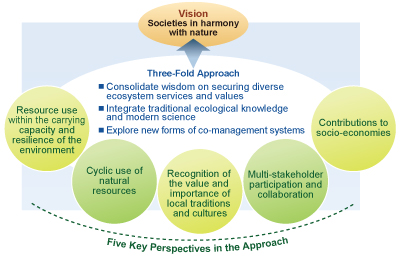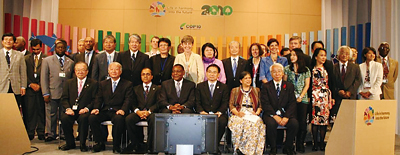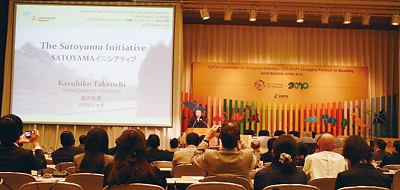MOE > Global Environment > International Environmental Cooperation HOME > Publications > CAI Brochure (Factsheet)
Promote societies in harmony with nature, while adapting to climate change
| Project Name | Satoyama Initiative |
|---|---|
| Location | Worldwide |
| Background | Protecting biodiversity entails not only preserving pristine environments, such as wilderness, but also conserving human-influenced natural environments, such as farmlands and secondary forest, that people have developed and maintained sustainably over a long time. These human-influenced natural environments are often inhabited by a variety of species adapted to and rely on these landscapes to survive, hence they play an important role in sustaining and enhancing biodiversity. But these landscapes - and the sustainable practices and knowledge which have shaped them - are increasingly threatened in many parts of the world, due for example, to urbanisation, industrialisation, and rapid change in local population characteristics. Measures are urgently needed to conserve these sustainable types of human-influenced natural environments through broader global recognition of their value. To tackle this critical issue, the Ministry of the Environment of Japan and the United Nations University Institute of Advanced Studies (UNU-IAS) jointly initiated the Satoyama Initiative. This international effort promotes activities consistent with existing fundamental principles including the Ecosystem Approach. Our vision is to realise societies in harmony with nature, that is, built on positive human-nature relationships. |
| The Vision and the Approach | The vision of the Satoyama Initiative is to realise societies in harmony with nature, comprising human communities where the maintenance and development of socio-economic activities (including agriculture and forestry) align with natural processes. By managing and using biological resources sustainably and thus properly maintaining biodiversity, humans will enjoy a stable supply of various natural benefits well into the future. Through the Satoyama Initiative, we will review, with social and scientific points of view, how relationships between humans and nature should function in what are now referred to as socio-ecological production landscapes (SEPL). Our three-fold approach is intended to maintain and rebuild landscapes in which land and natural resources are used and managed in a more sustainable manner:
 |
| Project Achievements |
 Launching ceremony of IPSI (introduction of founding partners)  Launching ceremony of IPSI (presentation by the United Nations University) |
| Planned Activities | The first Global Conference of IPSI will be held in Nagoya, Aichi, Japan from March 10-11, 2011. |
| Partners | IPSI participating organizations |
| Related URL |


